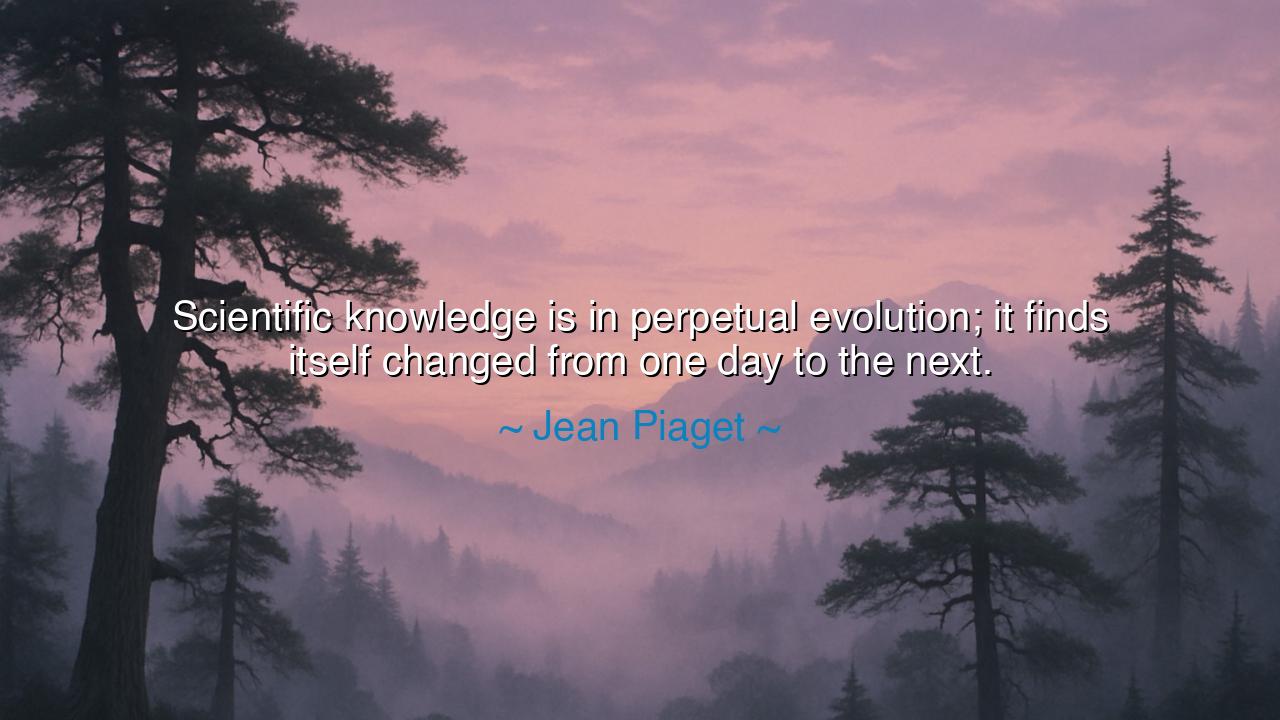
Scientific knowledge is in perpetual evolution; it finds itself
Scientific knowledge is in perpetual evolution; it finds itself changed from one day to the next.






“Scientific knowledge is in perpetual evolution; it finds itself changed from one day to the next.” Thus spoke Jean Piaget, the great Swiss psychologist and philosopher of learning, whose life was devoted to understanding how the human mind grows, transforms, and perceives truth. In this single sentence, Piaget captures the living, breathing nature of knowledge — that it is not a monument, fixed and eternal, but a river, flowing and ever-changing. His words remind us that science, far from being a rigid collection of facts, is a ceaseless journey of discovery, correction, and renewal. The wise, therefore, must not cling to knowledge as possession, but walk with it as a companion through time.
When Piaget declared that scientific knowledge is in perpetual evolution, he was speaking not only as a scholar but as a philosopher of life. He had observed in children the purest form of inquiry — how they question, test, err, and grow, how their understanding of the world changes with each experience. From their play, he drew a vision of the human intellect itself: forever constructing, forever refining, forever evolving. Just as the child rebuilds their world with each new discovery, so too does mankind. What we hold as truth today may be reshaped tomorrow by a deeper insight, a finer observation, or a greater understanding. This is not the failure of science, but its glory — that it moves, adapts, and learns as we do.
From the dawn of civilization, this truth has unfolded before us. The ancients once believed that the heavens revolved around the earth, that the sun was its servant, and that the stars were holes in a dark veil. For centuries, this vision stood unchallenged — until a man named Copernicus dared to look anew and whispered that perhaps it was the earth that moved. Then came Galileo, who lifted his telescope to the sky and saw the moons of Jupiter, proof that not all celestial bodies revolved around our world. And so, with courage and observation, the firmament shifted. The universe was no longer a divine stage centered upon man, but an endless expanse, humbling and vast. Here, we see Piaget’s truth made manifest: that scientific knowledge changes from one day to the next, and with it, the boundaries of the human spirit expand.
Yet, my children, do not mistake this evolution for instability. Science does not wander in chaos, nor does it abandon the past; rather, it builds upon it, as coral builds a reef. Each discovery rests upon the bones of those that came before, and though the shape may change, the foundation remains. What Newton saw as immutable law, Einstein reimagined as relativity — not contradiction, but deepening. What once was thought final becomes a step toward the infinite. Thus, knowledge is not a tower that reaches heaven, but a mountain whose peak ever retreats, drawing us onward toward truth.
Piaget’s insight reveals something deeper still — that the evolution of scientific knowledge mirrors the evolution of the human soul. As the world changes, so must our understanding of it; as we change, so too must the questions we ask. The fool clings to certainty, the wise man embraces growth. The one who says, “I know all,” has ceased to learn; but the one who says, “Teach me,” walks forever in the light of discovery. Thus, humility becomes the highest virtue of the thinker — to accept that every truth is but a doorway to a greater one, every answer the beginning of another question.
Consider the story of Louis Pasteur, whose study of disease and decay transformed medicine and saved countless lives. He was mocked for suggesting that invisible life — microbes — caused illness. Yet through experiment and perseverance, he revealed a hidden world within a drop of water, unseen yet powerful. And from this revelation, humanity was reborn — plagues were conquered, surgery was transformed, and life itself lengthened. Pasteur’s triumph was not only scientific but moral: he showed that the unknown is not to be feared, but explored, that truth changes not to deceive us, but to free us.
So, my children, let this be your lesson: welcome the evolution of knowledge as you welcome the dawn. Do not fear when the old ideas fall away, for they fall only to make room for the new. Be not rigid in your beliefs, for rigidity is the armor of ignorance, while openness is the breath of wisdom. The world changes, and so must you — in thought, in heart, in spirit. Learn as the child learns: with curiosity, courage, and humility.
For as Jean Piaget teaches, knowledge is alive. It grows with each question asked, with each truth challenged, with each step humanity takes toward the horizon of understanding. And though we may never grasp the totality of truth, the pursuit itself is divine — for in seeking to understand the world, we also come to understand ourselves. Thus, let your mind be as the river: always moving, always seeking, and always carrying forward the eternal current of human thought.






AAdministratorAdministrator
Welcome, honored guests. Please leave a comment, we will respond soon